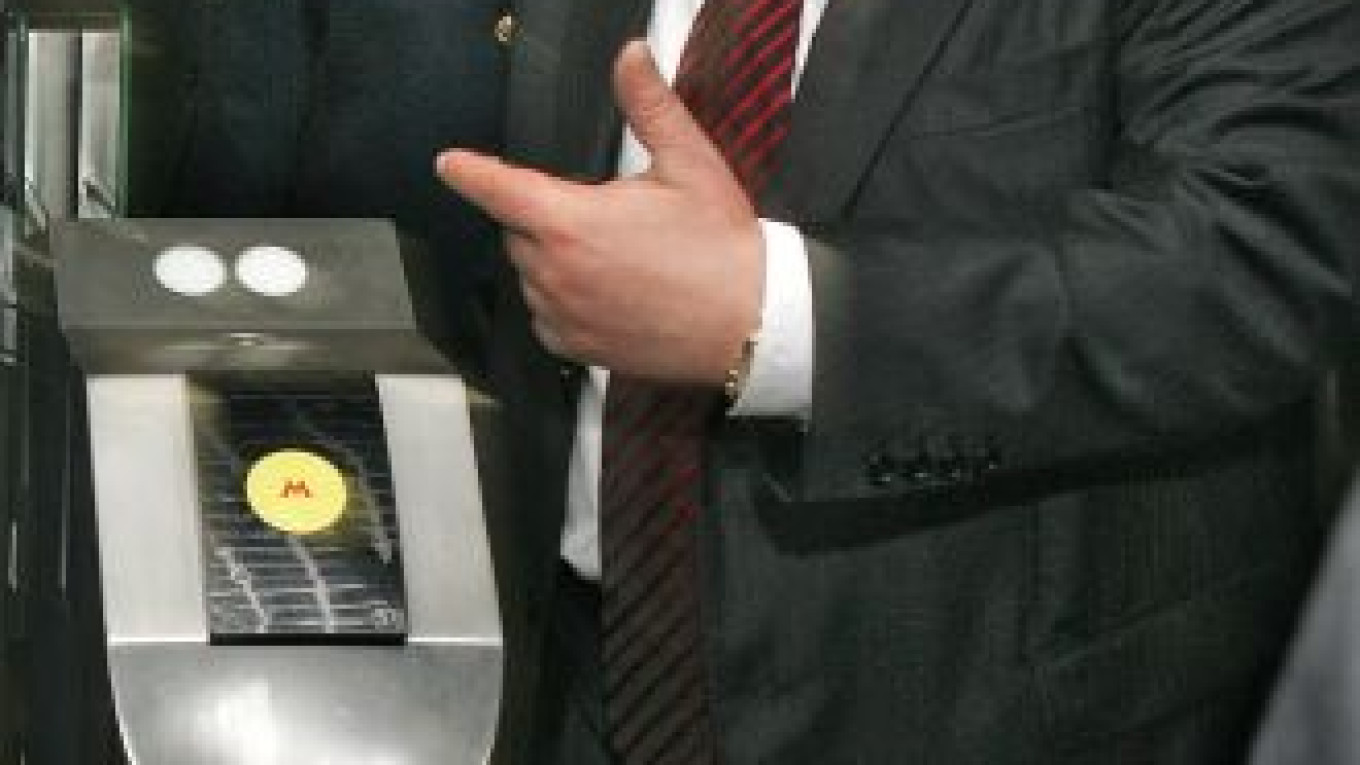Moscow metro chief Dmitry Gayev became the latest Luzhkov-era official to fall on his sword Monday as Mayor Sergei Sobyanin seeks to remedy a growing fraud scandal and install his own team in key municipal posts.
Gayev, who had headed the Moscow metro since 1995, was relieved of his duties “at his own request,” a curtly worded statement posted on the City Hall web site said Monday.
He will be replaced by Ivan Besedin, 57, a career railwayman who has led the Kaliningrad region's railways since 2006. The city has signed a five year contract with Besedin, according to the statement.
As a long-term member of former Mayor Yury Luzhkov’s circle, rumors had been circulating about the stability of Gayev’s position following Luzhkov’s ouster in September last year.
It became clear that Gayev's time was up after the Auditing Chamber reported on Friday that Moscow transport chiefs had misspent $7.3 billion, or about 37 percent of their total budget, between 2008 and 2010. That included 3.3 billion rubles ($110 million) misspent by the Moscow metro.
Deputy Mayor for transport Nikolai Lyamov responded to Friday’s report by calling the rumors about Gayev's ouster “baseless.”
Gayev the Inventor
Sobyanin ordered a wide-ranging investigation into the metro's finances in November.
In mid-December, the Prosecutor General's Office asked Sobyanin to consider dismissing Gayev after it found “violations on the side of the Moscow metro management.”
Specifically, prosecutors alleged that Gayev embezzled 112 million rubles ($3.8 million) through a complex scheme of latching on to intellectual rights and royalties to technical inventions created by metro engineers and supplier companies.
The prosecutors said the metro chief patented new equipment — including automatic payment machines, video monitoring and ventilation systems, and unique technologies for building stations deep underground — as his own inventions, then earned millions in payments and royalties from partners who sold his inventions to the metro. Gayev denied the charges.
The prosecutors also accused him of “entering into contracts that adversely affected ticket prices” — a comment that suggested the metro chief could be made the fall guy for deeply unpopular annual tariff increases.
Viktor Dvurechensky, head of the city's Control and Auditing Chamber, echoed the accusation Friday when he reported that the metro had misspent 3.3 billion rubles ($1 billion), but had increased revenues by hiking ticket prices in the face of falling passenger numbers.
The latest hike, on Jan. 1, raised the price of a one-trip ticket from 26 to 28 rubles.
Dvurechensky added that a long-term exclusive contract between the metro and the Olimp advertising firm resulted in a loss of advertising revenues of 10 to 20 percent, while delays and inefficiencies had inflated the cost of building new stations by 30 percent.
It is unclear whether Gayev, who has refused to comment on “rumors,” will end up in court.
The auditors said Friday that it was too early to say whether the overspending they had uncovered constituted criminality.
But Alexei Mukhin, head of the Moscow-based Center for Political Information, said it was inevitable that someone's head would roll over the scandal, though it remains “unclear whether charges would be brought against Gayev himself, or someone in his circle.”
Sobyanin Assembles His Crew
Besedin, who left Kaliningrad for Moscow on the 21-hour Yantar express on Saturday, told a reporter from the Regnum.ru web site who button-holed him as he embarked that “I can't yet say that I've been signed, so I'm not going to discuss it.”
Mukhin said the choice of replacement is in keeping with Sobyanin's strategy of drawing on experience from across the country.
The new metro leader will be charged with improving the inefficiencies uncovered by the Audit Chamber and delivering on Sobyanin's promised to build 53 kilometers of new track by 2014.
Besedin is not new to the capital. A graduate of the Moscow Institute of Rail Transport, he served a brief stint as a deputy head of Moscow Railways between 1999 and 2000, according to a biography on the Russian Railways web site.
He is also a former first deputy railways minister and deputy head of Russian Railways, and headed the All-Russian Railway Research Institute before moving to Kaliningrad in 2006.
In Kaliningrad he honed his international collaboration skills by successfully coordinating a complex rail service that runs through Minsk and Vilnius to link Kaliningrad to Moscow.
A Message from The Moscow Times:
Dear readers,
We are facing unprecedented challenges. Russia's Prosecutor General's Office has designated The Moscow Times as an "undesirable" organization, criminalizing our work and putting our staff at risk of prosecution. This follows our earlier unjust labeling as a "foreign agent."
These actions are direct attempts to silence independent journalism in Russia. The authorities claim our work "discredits the decisions of the Russian leadership." We see things differently: we strive to provide accurate, unbiased reporting on Russia.
We, the journalists of The Moscow Times, refuse to be silenced. But to continue our work, we need your help.
Your support, no matter how small, makes a world of difference. If you can, please support us monthly starting from just $2. It's quick to set up, and every contribution makes a significant impact.
By supporting The Moscow Times, you're defending open, independent journalism in the face of repression. Thank you for standing with us.
Remind me later.


